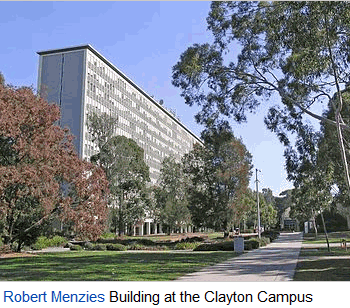|
|
|
|
|
|
|
News & Views item - May 2013 |
![]() MOOCs and the Professor of Economics. (May 6, 2013)
MOOCs and the Professor of Economics. (May 6, 2013)
Stephan King is Professor of Economics at Monash University which currently
caters for some 39,000 undergraduates and 16,000 postgraduate students with
campuses at Clayton, Caulfield, Berwick, Peninsula, Parkville, Gippsland,
Malaysia, South Africa, India, Italy and China. It's number of academic
employees is currently listed on Wikipedia as 8,172.
Professor King writing in today's The Conversation under the heading "As the MOOC counter-revolution starts, how will Australian universities respond?" notes that: "Professors of philosophy at San Jose State University... have written an ‘open letter’ (via the subscriber only Chronicle of Higher Education) rejecting the use of MOOCs. [and consider] the potential of MOOCs to create a world of higher education ‘haves’ and ‘have nots’. The authors fear two classes of university:
[O]ne, well funded colleges and universities in which privileged students get their own real professor; the other, financially stressed private and public universities in which students watch a bunch of videotaped lectures and interact, if indeed any interaction is available on their home campuses, with a professor that this model of education has turned into a glorified teaching assistant.
This leads Professor King to ask: "How do you have a ‘massive’ course but maintain interaction between the teacher and the students and, more importantly, between the students themselves? While MOOCs can deliver excellent on-line material that can replace lectures, they cannot easily create the environment where students can interact and learn from each other... This risk is real. ...Administrators may see an opportunity to reduce the funding for teaching (along with academic headcount) by using on-line material as a replacement for student face time... [especially] in an ‘undifferentiated’ university sector like Australia."
And finally: "the incentives to use on-line materials as a substitute to save money will be tempting for university administrators. So Australian tertiary education is fast approaching a tipping point. Will on-line material be used to complement and improve the on-campus experience? Or will it be used as a money-saving substitute that downgrades student learning and reduces academic employment?"
Professor King's article has currently engendered 11 comments which are well worth reading -- like it or not Information Technology is impinging increasingly on all aspects of this planet's environment, and in the case of higher education in Australia it is happening now and quickly. How well our universities adapt and are allowed to adapt will have a profound effect on the nation's commonweal -- Sleepers Wake.